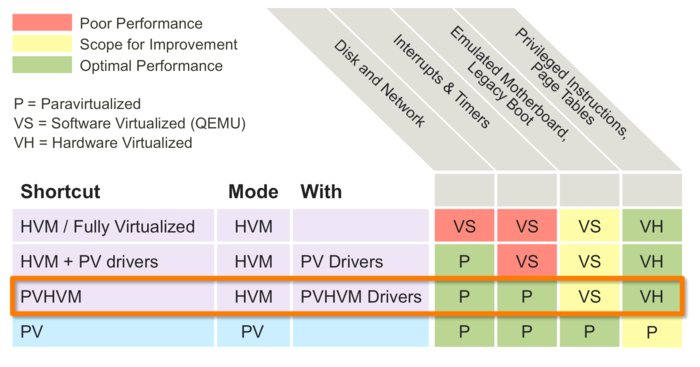Difference between revisions of "PV on HVM"
Lars.kurth (talk | contribs) (Created page with "== What is it? == PV on HVM is a mixture of paravirtualization and full hardware virtualization. The primary goal of PV on HVM is to boost performance…") |
Lars.kurth (talk | contribs) (→What is it?) |
||
| (2 intermediate revisions by one other user not shown) | |||
| Line 4: | Line 4: | ||
The table shows how PV, HVM and PV on HVM compare in terms of virtualization method: |
The table shows how PV, HVM and PV on HVM compare in terms of virtualization method: |
||
| + | [[File:XenHVM-All.png|700px]] |
||
| − | {| class="wikitable" |
||
| − | |style="width: 20%;"| |
||
| − | !HVM |
||
| − | !PV on HVM |
||
| − | !PV |
||
| − | |- |
||
| − | !align="left"|Boot Sequence |
||
| − | |style="width: 10%;"|Emulated |
||
| − | |style="width: 10%;"|Emulated |
||
| − | |style="width: 10%;"|Paravirtualized |
||
| − | |- |
||
| − | !align="left"|Memory |
||
| − | |Hardware |
||
| − | |Hardware |
||
| − | |Paravirtualized |
||
| − | |- |
||
| − | !align="left"|Interrupts, Timers & Spinlocks |
||
| − | |Emulated |
||
| − | |Paravirtualized<br/>(Emulated on Windows) |
||
| − | |Paravirtualized |
||
| − | |- |
||
| − | !align="left"|Disk & Network |
||
| − | |Emulated |
||
| − | |Paravirtualized |
||
| − | |Paravirtualized |
||
| − | |- |
||
| − | !align="left"|Privileged Operations |
||
| − | |Hardware |
||
| − | |Hardware |
||
| − | |Paravirtualized |
||
| − | |} |
||
== Performance == |
== Performance == |
||
| Line 43: | Line 13: | ||
== Compatibility == |
== Compatibility == |
||
| − | The following links provide information about Xen |
+ | The following links provide information about Xen Project PV on HVM compatibility with various operating systems: |
* [[Xen_Kernel_Feature_Matrix#KernelCompatbility|HVM on PV support in the Linux Kernel]] |
* [[Xen_Kernel_Feature_Matrix#KernelCompatbility|HVM on PV support in the Linux Kernel]] |
||
* [[Xen_Kernel_Feature_Matrix#XenLinux|HVM on PV in (legacy) Linux distributions]] |
* [[Xen_Kernel_Feature_Matrix#XenLinux|HVM on PV in (legacy) Linux distributions]] |
||
| Line 50: | Line 20: | ||
* [[Xen_Linux_PV_on_HVM_drivers|Information about using PV-on-HVM drivers]] |
* [[Xen_Linux_PV_on_HVM_drivers|Information about using PV-on-HVM drivers]] |
||
* [[Using_Xen_PV_Drivers_on_HVM_Guest|HowTo on PV-on-HVM drivers]] |
* [[Using_Xen_PV_Drivers_on_HVM_Guest|HowTo on PV-on-HVM drivers]] |
||
| − | * [[Xen_FAQ_Drivers,_Windows|Xen Windows HVM guests can use the opensource GPLPV drivers]] |
+ | * [[Xen_FAQ_Drivers,_Windows|Xen Project Windows HVM guests can use the opensource GPLPV drivers]] |
[[Category:Xen]] |
[[Category:Xen]] |
||
| Line 57: | Line 27: | ||
[[Category:Beginners]] |
[[Category:Beginners]] |
||
[[Category:Glossary]] |
[[Category:Glossary]] |
||
| + | [[Category:Fundamentals]] |
||
Latest revision as of 16:35, 20 April 2015
What is it?
PV on HVM is a mixture of paravirtualization and full hardware virtualization. The primary goal of PV on HVM is to boost performance of fully virtualized HVM guests through use of specially optimized paravirtual device drivers (also called PVHVM or PV-on-HVM drivers).
The table shows how PV, HVM and PV on HVM compare in terms of virtualization method:
Performance
PV-on-HVM drivers are optimized PV drivers for HVM environments that bypass the emulation for disk and network IO. They also make use CPU functionality such as Intel EPT or AMD NPT support. Thus, giving you PV-like or better performance on HVM systems. You can find information about performance trade-offs in this presentation. In a nutshell:
- For workloads that favor PV MMUs, PV on HVM is similar to PV
- For workloads that favor nested paging (in hardware with Intel EPT or AMD NPT support), PV on HVM performs better than PV
Compatibility
The following links provide information about Xen Project PV on HVM compatibility with various operating systems:

